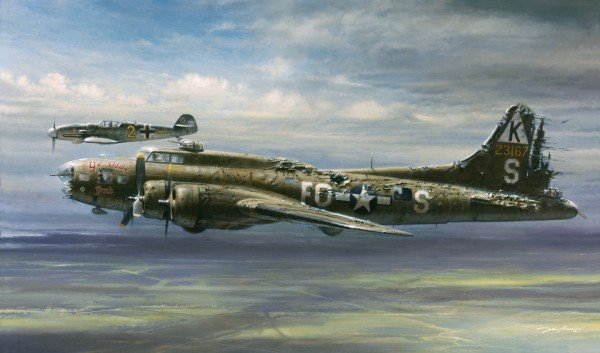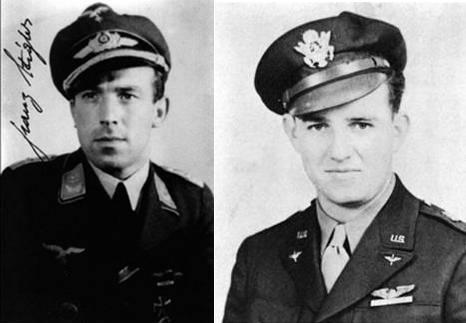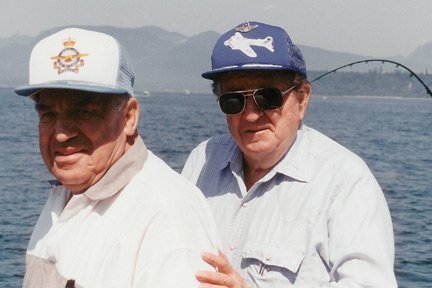Mercy is one of the great hallmarks of chivalry. Mercy toward one’s enemy is the hardest mercy of all, which is probably why Jesus instructs us to love our enemies.
The following is taken from the Men Who Lead blog by best-selling author Marcus Brotherton. Mr. Brotherton’s post is titled, The Most Overlooked Command Ever. Be sure to take the time to read his original post and add his blog to your regular reading to learn more Lessons in Leadership.
On December 20, 1943, in the skies above war-torn Europe, two bitter enemies—an American B-17 bomber pilot and a veteran German fighter ace—met in what is undoubtedly one of World War II’s most remarkable encounters.
The American bomber, piloted by 21-year-old West Virginian Charlie Brown, was severely damaged. Bullets from German fighters had chewed the bomber to pieces. Others bullets had shot straight through the fuselage, and several crew members had been hit and were near death.
The German fighter plane, piloted by Franz Stigler, was poised to blast the bomber from the sky. It was Franz’s job to kill the enemy. His sworn duty was to triumph in blood.
In fact, encountering a wounded bomber was Franz’s lucky break. Other fighters had already done the initial damage, and when Franz flew up to the bomber, it was the most badly damaged airplane he’d ever seen still flying. That meant an easy target. And in the kill-or-be-killed quest to reach air superiority, the odds against the German’s survival were much worse than the American’s. Of the 40,000 German fighter pilots in WWII, only 2,000 survived.
But what happened in that tense moment when Franz and Charlie came to stare at one another across the frozen skies only can be described as other-worldly.
The American 8th Air Force would, in fact, classify the incident as top secret for decades.
The German military sealed the record as well. Franz was ordered never to speak of the act again, at risk of facing a firing squad.
What happened was, very simply … mercy.
Franz didn’t turn his machineguns on the Americans.
Instead, Franz risked his own reputation, career, and even life, to fly for miles in close proximity to the bomber’s wingtip, providing a “shield” for the damaged enemy plane.
Instead of killing his enemy, the German fighter pilot escorted the sputtering American bomber to safety.
See also the post, Compassion for Others – Even the Enemy.




Too bad the Allies couldn’t show a bit of mercy to the thousands of women, children and civilian men hightailing it out of Dresden in 1945. I guess watching them get barbecued by firebombs was more entertaining.
Dresden was one of the most spectacularly cruel and brutal things that America has ever done – and there are a lot of such events to choose from. My eyes were first opened to that bit of hidden history after reading an essay by Louis Beam titled I Cried Tears for Dresden. It is still a classic on the topic.
Thanks for posting this.
Re: Dresden….total war goes back as least as far as Dishonest Abe and his various generals and aides who advised and carried it out against the south during his war in the furtherence of totaliarianism and maintaining the false union we have today. Ike in WWII’s aftermath did the same to German civilians after that war.
I read a book on the 8th Air Force. They interviewed a Jewish navigator on a B–17 who had been on the Dresden raid. He said that he doesn’t lose a minutes sleep over it because he figured his plane didn’t hit any Jews. The good people of Dresden had already shipped them out to the camps while they were sieg heiling. So spare me the tears for the Germans. They deserved every bit of what they got, plus.
Mr. Pearlman,
I rather suspect that many in the North used that same line of thinking to justify, in their own minds, Sherman’s march through Georgia. They laid waste to fields and barns and homes, leaving Southern women and children to starve. Life itself was considered a military target. It was a government decision to destroy literally everything, sparing nothing and no one. It was the mid-nineteenth century version of carpet bombing. It was the beginning of the concept of Total War in which every living thing in the opponent’s land was a legitimate target.
You can look at Dresden and see only dead evil Germans – or you can see dead men, women, and children who were just as opposed to Hitler as I and others are to Obama and all those who now boast, “It’s OUR country now!”. They had as much chance to stop Hitler and his actions as I do to stop Obama and his agenda – None. They probably worked at it – as many of us have and continue to do. There were probably White Rose members (die Weiße Rose) among the incinerated of Dresden.
Yes, war is sometimes necessary, unavoidable, and right. Yes, some level of civilian deaths and collateral damage is unavoidable. We all understand that, but that’s not what Dresden was about. But then you already know that.
Suit yourself. As for me, I see Dresden (and a long string of similar actions of our government and others) in a very different light. One day, each of us will have to answer for that. I would not want to stand before God and try to justify your statement.
Pingback: Mercy and Chivalry in Wartime « BritNorAmFreedom
Pingback: Misericórdia nos ceús durante a Segunda Guerra Mundial - Imagens Históricas